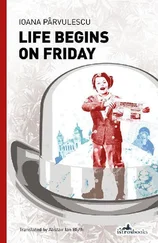An apricot.
A little car.
A pen, a seashell, a shekel, a coin.
Ava pushes the objects on the board back and forth, she rearranges them; then she returns them to their original positions.
She says, You can buy the apricot, or you can take the shell. You can make a necklace for yourself with the shell. This here is a car. Papa’s car from his childhood. A very old car. Old.
She puts the pail upside down on the board and the car on top of the pail. She gets out of the sandpit and walks over to the edge of the field, she looks at it and thinks it over thoroughly; then she snaps off a yarrow, a poppy and a chamomile flower, ties them together into a bristly bouquet, and puts the bouquet on the board next to the apricot.
She says pensively, I’m thirsty.
She says, Today at kindergarten there was a man nobody knew. Nobody knew him. He had on a black sweater with a hood, and he told me to say hello to you, Mama. I didn’t say anything. Do we know him? Have you ever seen him?
When Stella picks up Esther and Walter’s key from the office, Paloma, telephone receiver at her ear, signals to her to wait. She beckons with her index finger, indicating the chair in front of her desk.
Stella makes coffee while Paloma is telephoning. She listens to Paloma’s unemotional, cool voice. If the family doesn’t want to rely on the nursing staff, we have to end the relationship. You’re underestimating your mother. You underestimate your mother’s abilities, the mental faculties of elderly people in general.
Paloma listens to the voice on the receiver with a nasty smile. The kettle rumbles and switches off. The smell of the instant coffee is delicious and artificial, reminding Stella unfailingly of campsites, nights in tents, waking up by the ocean; it never and will not later ever remind her of Paloma’s office, of the postcards above Paloma’s desk, or of the static stillness of those years.
She takes a mug with a tiger on it for herself and one with the words destroy something on it for Paloma. She waits, then pours water over the two teaspoons of coffee, stirs some coffee whitener into each, then places Paloma’s mug next to the phone.
Paloma says, Think it over. Best wishes for the time being; please get in touch once you’ve made your decision; she makes a horrible grimace, puts the receiver back and turns to Stella. She says abruptly, This morning there was a man here. Standing outside the office when I arrived; could be he’d already been waiting for a while. He asked about personnel. About a nurse for his mother. He asked about you.
What did you say, Stella says. She feels as if she’s falling, falling forward, towards Paloma.
Well, he asked for your phone number, Paloma says slowly. To contact you; he wanted your number.
Paloma looks at Stella for a long time. Then she says, Of course I didn’t give it to him. I said I was in charge of making arrangements. He can’t choose his own personnel here anyway.
Yes, Stella says.
Paloma says, Stella, I’m not sure. That was a pretty weird sort of guy, and he didn’t look like someone who’d be worried about his sick mother. To be frank, he looked deranged. I told him we were fully booked. We had no available staff. A young man in a black hooded sweater, good-looking actually. But all done in. Do you know who that could have been?
No, Stella says. Don’t know, no idea.
She has to get out of there before she starts to cry; she really has to see to it that she can get out of there, disappear.
She says, OK, Paloma. I’ve got to go now. Esther is waiting. I’ve got to go. I’ll come back later. Maybe you’ll still be here then.
I’ll still be here, Paloma says. Of course I’ll still be here then. Why did you make coffee for yourself if you have to leave right away. You’re as white as a sheet, Stella. What’s the matter with you?
Stella tries not to think about Mister Pfister. She tries to do away with him by not thinking of him, to get him out of her house by not thinking about him. It’s impossible.
She wakes at daybreak; the coordinates of the days intrude into her half-sleep.
Ava.
The house in the development on the outskirts of the city, the room under the roof, the bed with the window on the right, the not-quite closed door on the left, and on the other side of the door, the hall, Ava’s room, Ava.
Jason. Present, his slender form next to her in bed so surprisingly slight in sleep; Jason’s absence, Jason rather far away, and the bed next to Stella is empty.
Time of day, morning around six, and the season, summer.
The window is open; many diverse and wary bird voices.
And Mister Pfister. Still there.
Stella turns on her side and imagines Mister Pfister waking up. He wakes up in his room next to the kitchen. She is sure he doesn’t use all the rooms in his house, that the many rooms in his house are too much of a challenge for him. He’ll keep the doors to them closed, possibly locked; he’ll only rarely go upstairs to the first floor. He has retreated to the room next to the kitchen, the room that corresponds to Stella and Jason’s living room. The room is dark because the picture window is draped with black felt. Mister Pfister isn’t awakened by daylight and wakes up at all sorts of times, sometimes at dawn, sometimes during the night, also in the afternoon or early evening. Time, Stella thinks, is relative for Mister Pfister. It is dark when he wakes up, or it is bright, it is dawn turning into day or already dusk turning back to night; it rains, snows, then the sun rises.
For Mister Pfister time is different, it ticks differently; Stella’s time is what determines Mister Pfister’s time. If Stella’s time didn’t exist, and Ava’s and Jason’s — then there would be a different one for him. Mister Pfister wakes up and lies there, simply lies there with closed eyes, and at six o’clock in the morning he hears exactly the same things as Stella — birds, the distant noise of traffic, the slamming of car doors — yet under or maybe over it, he hears something completely different, a mesh, a web of voices that Stella can’t hear, a disembodied whispering.
Then he gets up.
Stella sees Mister Pfister getting up and going into the kitchen and turning on the kettle. He rolls himself a cigarette while he waits for the water to boil. The kitchen is only dimly lit. There’s quite a lot of paper on the floor; in a bowl in the corner by the window onions are sending glowing green shoots up into the air like flames; there are far too many bottles in this kitchen, beer bottles, wine bottles, pickle jars, and piles of paper under which the essential things — pens, packets of tobacco, lighters, notes, viewpoints and thoughts — get lost; but they’ll all turn up again, no need to worry about that. Nothing gets lost; it all goes around in a circle.
The water is boiling. Mister Pfister pours hot water on top of a large spoonful of coffee in a dirty mug; the image of the dirty mug fills Stella with satisfaction. He drinks his coffee black, without milk and without sugar. What does the aroma of coffee in the morning remind Mister Pfister of; I don’t even want to know, Stella thinks; I really don’t want to know.
Mister Pfister opens a beer to go with his coffee. He finds one among all the empty bottles; there’s always one last beer still there. The cigarette crackles extravagantly. Everything is hot and cold at the same time, light and dark, soft and loud. And paper is scattered everywhere. Paper spreads from the kitchen into the living room, crunched-up paper, paper densely covered with writing, graph paper from school notebooks in the midst of stacks of newspapers, notebooks, boxes, piles of wrapping paper, advertisements and cardboard; but Mister Pfister strides through it all as if over water, he strides back to the living room and only now turns on the music, frees up the room — it’s Bach.
Читать дальше












